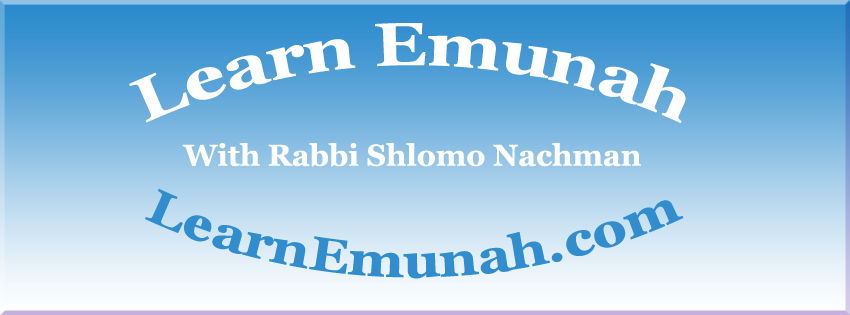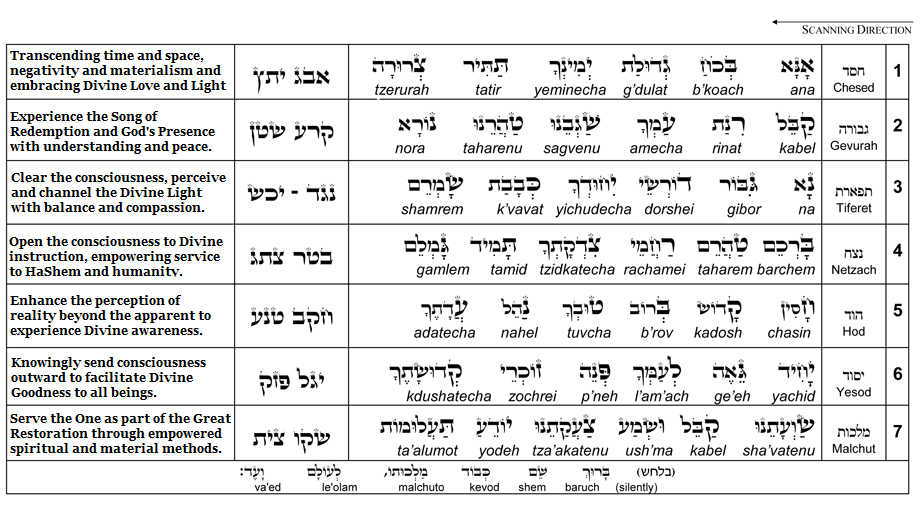
|
|
|
|
|

 | ||
The Ana BeKo'ach or Portal of Creation was composed during the 1st and 2nd centuries CE by the Merkabah mystic Rav Nehunia Ben Hakannah. Bava Batra 10b describes him as an accomplished tanna or teacher and contemporary, not as a student, of Rav Yochanan ben Zakai. It is traditional for Jews, especially mystically oriented Chasidim, to devote time to meditating on the Ana BeKo'ach each night as the Chanukah lights illumine their dwellings.
Many congregations, including our Beit Emunah, sing the Ana BeKo'ach at every Shabbat service as we desire to go back in time to the creation of material life in order to discover its origin, reestablish meaningful connections with our Creator, and seek teshuvah or spiritual reconnection with Him. We pray that the Beloved One will free us from all misconceptions and restore for us the simple, and yet oh so profound, ecstasy of His Presence and Mercy.
But how does the Ana BeKo'ach propose to accomplish this? This is a great secret of the ages that is being restored and embraced by more and more people. By utilizing the power or spiritual energies of the Ana BeKo'ach, one unlocks the gates or portals of concealed Truth and prepares ourselves spiritually and physically for what is coming.
In biblical times, on Yom Kippur, the High Priest stood before the people and declared:
On this day, Adonai will grant atonement for you to cleanse you. Before Adonai, you will be cleansed of all your sins.According to the Chassidim, mystically, the 'High Priest' referenced here refers to the Sacred Name Havayah , which symbolizes the 42-letter Name of God. Hearing the Sacred Name, the people would fall to the ground on their faces before the Named One in yirah (יראה, pronounced yir-ah): awe or fear.
Understand:
The Holy One transcends all human knowing; therefore, when we speak of "His" Name, we are speaking words we cannot fully comprehend. With this understanding, the High Priest would speak the Sacred Name: Havayah, and the people would prostrate in honor of the Named One. There is some debate among Jewish scholars about whether the Cohen Gadol actually uttered the 42 Letter Name at this annual event or merely alluded to it. Most Chasidim believe he spoke the Name aloud publicly. Regardless, Havayah, which literally means Being or I Am, is a form of the Tetragrammaton, The Creator's Divine Name of the four Hebrew letters YUD, HEI, VAV, and a final HEI. This Name expresses the Creator's complete transcendence of time and space.
Understand:
Since He is completely One (echad), transcending time and space, so too are our Neshamot or Souls. Although our bodies continually age and pass away, the Soul is eternal and enduring. We, too, transcend time and space.
The Ana BeKo'ach is a mystical formula of 42 letters, written in seven sentences of six words each. Each of these seven sentences corresponds to the seven days of the week, to the Torah's first verse which has seven words, to the holiday of Shavuot meaning seven weeks, to the seven Noahide Laws, to the seven day holy days of Pesach and Sukkot, to the seven days of sitting shiva for the dead, for the seven candles of the menorah, the seven major holidays of the Jewish calendar, to the seven thousand years granted to humankind for our rectification, and to the Heavenly Beit Din (or court) which is composed of seven elders, to the seven specifically named angels — although the identity of these seven holy angels in Judaism is debated. Since Judaism is monotheistic (worships only the One God) and shuns the adoration of angels, no official list exists in biblical or Rabbinic listings of angelic entities. However, the Apocryphal Book of Tobit offers what is widely accepted as the correct listing of the seven chief angels, as being Michael, Raphael, Gabriel, Uriel, Sariel, Raguel, and Remiel. Note that some Jewish mystics speak of thirteen principal angels, while some non-mystical Jews deny any individuality to the angels. — Most times, the angels are regarded as Light Bringers, regardless of the Rabbinic debates about them, which makes them relevant to our study of the Festival of Light.
The Hebrew letters of the Ana BeKo'ach are "concealed" within the first 42 letters of the book of Genesis from the word "bereishit" ("in the beginning") to "Vavohoo," ("without form, and void"):
בְּרֵאשִׁ֖ית בָּרָ֣א אֱלֹהִ֑ים אֵ֥ת הַשָּׁמַ֖יִם וְאֵ֥ת הָאָֽרֶץ׃
When Elohim began to create heaven and earth
וְהָאָ֗רֶץ הָיְתָ֥ה תֹ֙הוּ֙ וָבֹ֔הוּ וְחֹ֖שֶׁךְ עַל־פְּנֵ֣י תְה֑וֹם וְר֣וּחַ
the earth being unformed and void…When the Ana BeKo'ach is employed in hitbodedut (i.e., seclusion with God) as a meditation, our Soul Consciousness seeks to return to its Source, which is Havayah, which is revealed through the first 42 letters of the book of Genesis wherein the portal between Ain Soph (God beyond all conception) and the material manifestation of duality begins and opens. For this reason, the Ana BeKo'ach may be described as the Gateway or Portal of Creation. Through this meditation, we return to the Presence of Havayah, as actuated within the human consciousness. We elevate our consciousness to the untainted Light of An Soph (the Holy One in transcendence). We transport ourselves from duality to the state of consciousness known as Devekut, which is the state is True Light. This is the connection between the Ana BeKo'ach and Chanukah, the festival of Light. During Chanukah, we seek to light more than the lights of the chanukiah, even more than those of the Temple menorah, as we recall the Hasmoneans doing. We desire to reignite within our consciousness the Divine Light within us. This is the real meaning and goal of the holiday.
Human beings are almost always distracted. We dwell on the past and worry about the future, making the present moment often little more than the connecting point between these times. We need to live in the present, not in the past or the future. Being locked in time and space, we remain imprisoned until we awaken to the truth: We are not these limited bodies. We are pure Souls, but we have forgotten our real identities as the Children of the Holy One.
Understand:
Time and space are only illusions, te'atu'a. But illusions with purpose. What has been is already sealed and cannot be altered despite the wishful thinking of time travel stories. The book of the future is not yet written; therefore, it, too, is sealed from us, other than through divine revelations. What is to be depends on the interplay of innumerable factors. Some of these we can perceive, but most we cannot. This present moment is fluid. What we do now impacts the future, but who can be certain of the impact of our actions? Only the here and now can be written with some certainty. Indeed, it is being written, and this writing cannot be halted or rejected. The embodied Soul must act at all times, and our actions are being "written" into the Book of Life. Therefore, the wise focus neither on the past, except to learn from its lessons, nor on the future, except to achieve positive results, through present actions. Our focus should, therefore, be fully on this sacred moment because this is the totality of our current condition. Those wishing to escape the entanglements of space and time seek the portal of divine mercy and attain liberation.
The Holy One has no such limitations. Havayah always was and is and will ever be. Havayah now is, has always been, and will ever be echad, one! This is the non-dual consciousness of Devekut we seek! This is the Light of Truth. To be in the eternal Presence of the Holy One is to transcend all time and space. To accomplish this, the Ana BeKo'ach takes us back to the point of creation: time beyond time and space beyond space. This is where we enter and experience the abode of the Creator.
Ana B'cho-ach in English
A-na, Ana B'cho-ach
g'dulat y'minkha,
tatir tzerurah.
Kabel Rinat,
amkha -- sagveinu,
t'hareinu,
t'hareinu nora.
(second time go to: Shav-a-tei-nu)
Ana B'cho-ach.
g'du-lat y'min-cha.
tatir tzerurah.
Kabel Rinat,
amcha saag-veinu,
t'ha-reinu no-ra.
Na gibor-dorshei-yichudcha,
k'vavat shomreim
Barchem t'harem,
rachamem tzidkatkha;
tamid gomlem,
Khasin kadosh (exalt) –
Chasin kadosh, ba'rov tucha,
N'hel ada techa,
Yachid ge'eh,
l'amcha-p'neh,
zochrei k'dushatecha,
Shavateinu kaba'el,
ush'mah – tza'akateinu,
yodeah -- ta'ahlumot.
(Chorus)
(Ba-ruch shem k'vod mal-chu-to
l'o-lam va-ed.)With loving strength
Untie our tangles.
Your chanting folk
Raise high, make pure
Accept our song.
Like Your own eye,
Lord, keep us safe
We, who union seek with You!
Cleanse and bless us
Infuse us ever
With loving care.
Gracious source
Of holy power!
Do guide Your folk.
Sublime and holy One,
Do turn to us
Of holy chant.
Receive our prayer
Do hear our cry
You, Who all secrets knows.
Through time and space
Your glory shines,
Majestic One.
Blessed is the name
Of His Glorious Kingdom forever.A more devotional translation:
Please, by the great power of Your right hand,
Set the captives free;
Revered One, accept Your people’s prayers;
Strengthen us, cleanse us.
Almighty God, guard as the apple of Your Eye
all those who seek You;
Bless them, cleanse them, pity them;
Grant them Your truth;
Mighty, Holy One, in Your abundant Grace,
guide Your people;
Accept our prayers, hear our cries,
You who know our secret thoughts.
Blessed be the name of his glorious Majesty
forever and ever;
In this context, the Hebrew word for meditate is hagah (הָגָה). By meditating on or pondering the meanings contained within the Ana beKo'ach, one focuses the powers of kavanah or intention on the divine attributes with slow rhythmic repetitions of each word. Through this method, the essence of the attributes enliven the consciousness and lead one into the realms of devekut, God consciousness, wherein the Holy One's Presence is directly experienced.
For this practice, sit, lay, stand, or walk as comfortably as possible. Do not allow clothing, whether too tight or too loose, to distract you. As much as possible, safely become oblivious to your surroundings so that your mind is free to focus only on the Beloved. For this reason, doing this meditation in seclusion is usually preferred.

When this meditation is done nightly during the Chanukah candle lightings, we have the following guidelines: Each night, recite the appropriate blessing and light the Chanukiah as normal. Then, behold the candle(s) with consciousness in a relaxed state and focus on the following each night.
| |||||

Got Questions or Comments?
Let us know
|
|||
| search engine by freefind |
|
|||
| search engine by freefind | |||
|
|||
| search engine by freefind |